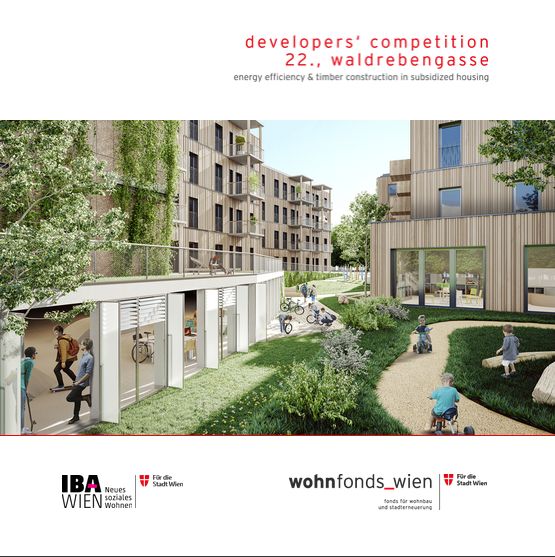Innovative energy solutions for subsidized housing
A developpers competition for energy efficient timber buildings
In order to promote further innovations in subsidized residential housing in the field of sustainability and energy, the City of Vienna has tendered the developers competition 22, Waldrebengasse in 2019. Its focus lies on the realization of affordable timber housing with a sustainable energy system. By 2024, 107 subsidized rental apartments will be created at particularly good conditions, taking different living situations and family constellations into account.
Exchange of know-how between Vienna and Vancouver
The developers competition Waldrebengasse emerged from the partnership with the Canadian city Vancouver, which is coordinated by the Energy Planning Department of the City of Vienna. With this cooperation, both cities are initiating the exchange of know-how and experience in the field of Green Building, so that the knowledge gained can be applied in subsidized housing projects.
In Vancouver, a housing project that deals with the applicability of the social housing model of Vienna to the local conditions in Vancouver is being implemented. At the same time, Vienna is implementing a housing project in Waldrebengasse, which incorporates the traditional experiences of the Canadian partner city in the field of timber construction. Both housing projects will be built to the highest efficiency standards and will maximize the use of renewable energy.
Sustainable energy system binding in call for tender
Subsidized residential housing in Vienna is subject to special requirements regarding the energy efficiency and quality of the building technology. As of 2007, only highly efficient alternative energy systems may be used, except in rare cases where they are not feasible.
The competition in the Waldrebengasse presented building developers with the task of using alternative energy systems and getting by without fossil fuels. In addition, there is no connection to the Viennese district heating system at the location.
Therefore, a new path was taken by the awarding authority, wohnfonds_wien, in cooperation with Wien Kanal as landowner, and the help of the Energy Planning Department of the City of Vienna. Detailed requirements for “sustainability and alternative energy forms” were already set in place in the call for tenders. These requirements include the mandatory use of renewable energy as heat supplier, the exclusion of fossil fuels and the mandatory use of a surface heating system, so that this system can also reduce peak room temperatures in the summer months.
High quality as a result of competition
This approach was a success. An unusually high number of teams took part in the competition. All ten projects were highly innovative in terms of sustainability and offered a variety of timber construction concepts. Experienced timber construction engineers and building technology experts were involved in all teams. As a result, all projects were planned to high standards and offered feasible results.

This content was originally published on blog.stadtentwicklung.wien.gv.at

